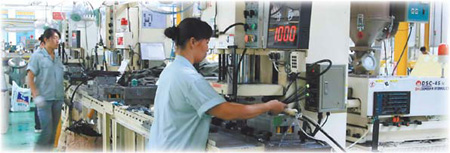Qingdao Tonghe Ecological Industrial Park
Updated: 2009-08-26
|
|||||||||
Tonghe in chic: industrial base makes overseas investments fashionable
Zhao Ruixue
|
Production line of Qingdao Daedong System Co Ltd. Ju Chuanjiang |
The successful development of its adjoining industrial park has had a huge "knock-on" benefit for Tonghe, a small town in Qingdao in the eastern province of Shandong. Thanks to the success of the park, it is now the fashionable place for foreign companies to invest.
As a result, the town is now a modern residential area, complete with a developed industrial base, contemporary infrastructure and a sound ecological environment.
Explaining the reasons for the town's renaissance, Wang Fujun, director of the Management Committee of the Tonghe Industrial Park, said: "The reasons that investors choose this place are not only because of its excellent investment environment and advantageous geographical position, but also its customized and specialized support services, which never fail to impress would-be backers.
"As a result, as well as population of 38,000 natives, the town is home to some 50,000 workers from across China. All of them are employed at one of the 320 or more domestic and overseas businesses based in the park."
To date, the 16 sq km park has a registered foreign capital of $1.8 billion, with $1.2 billion of it already in use. It also has a utilized domestic capital of 3.2 billion yuan.
Foreign investors from more than 10 countries and regions, including South Korea, Japan and India, have now established premises in the park. Topping the league is Korea, which now has more than 130 businesses registered in the area.
Wang attributed the growing number of businesses based in the park to a "ripple effect" generated by a few core companies on the site. This has seen manufacturers, such as South Korea's Qingdao Asia Woosung Enterprise Co Ltd, which boasts an annual production of 2 million sets of electronic parts, spawn a raft of ancillary and supply businesses.
Addressing the needs for comprehensive IT support for the park's growing number of businesses, its management team has invested 20 million yuan in jumpstarting a nearby computer technician college. In recent years, more than 6,000 of its graduates have contributed to the development of the park.
To further boost business, the local government has provided "credit guarantees" for certain companies, aimed at ensuring businesses in the park have ready access to financial support should they need it. It has also provided a range of apartments for visiting overseas businessmen and employees within the park, as well as making provision for both a cultural activity center and a dedicated business service center.
Despite the financial downturn, many of the existing business in the park have made an increased investment and expanded their local facilities. Over the last two years an additional $80 million has been generated from some 30 existing foreign enterprises in the park.
Commenting on future plans for the commercial center, Wang said: "We aim to develop the park into a national-level industrial cluster as well as a leading export base for automotives and auto industrial parts."
With a total investment of 300 million euros, Qingdao Daedong Syetem Co Ltd was the first company to move into the park. Its presence there triggered the growth of an entire auto parts industrial production chain, now a key part of the park's economic base.
In the wake of a $10 million auto parts order from a client in France, businesses in the park are now actively wooing investment from both the European and American markets. To date, a number of large purchasers from Germany, France, Hungary, Switzerland and America have undertaken fact-finding visits to the park, resulting in a wide array of new projects being discussed.
The park's largest project to date came about last year, when an American corporation secured a $60-million deal to produce sunshades for the US market.
Wang said: "We are now giving priority to attracting American and European investment over the next three to five years. We are currently in negotiations with regard to 50 such deals. These will undoubtedly optimize the park's industrial structure and enhance its future competitiveness."





